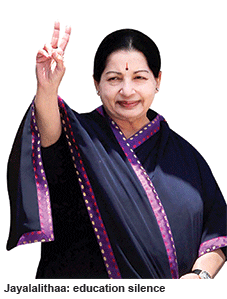Tamil Nadu: Crossed fingers
 Breaking a well-established tradition under which the AIADMK and DMK — Tamil Nadu’s two major political parties with roots in the make-believe world of popular Tamil cinema — have won state legislative elections by rotation, AIADMK supremo Jayalalithaa created history by sweeping to power in Fort St. George for a second consecutive term, winning 134 of 234 seats in the assembly elections concluded last month (May 16).
Breaking a well-established tradition under which the AIADMK and DMK — Tamil Nadu’s two major political parties with roots in the make-believe world of popular Tamil cinema — have won state legislative elections by rotation, AIADMK supremo Jayalalithaa created history by sweeping to power in Fort St. George for a second consecutive term, winning 134 of 234 seats in the assembly elections concluded last month (May 16).
Sworn in on May 23, she is the first chief minister in three decades after her mentor, the late M.G. Ramachandran (in 1984), to win a second consecutive term. Her victory is all the more remarkable as she contested this election without any political allies and reversed the traditional anti-incumbency wave.
With the initial euphoria surrounding her victory having died down, questions are being raised as to whether Jayalalithaa’s governance record of the past five years or the bounty of freebies promised to the electorate in her election manifesto, swung the people’s verdict in her favour. The AIADMK manifesto promises 100 units of free electricity for households every two months, 50 percent subsidy for women to purchase automotive scooters, free laptop computers with internet connection for all higher secondary students, 8 gm of gold for poor brides-to-be, free cellphones, nine months maternity leave, waiver of farm loans and a host of other handouts. However, on the pressing issue of rising unemployment which is an outcome of plunging school and college education standards, the AIADMK manifesto is silent.
Although Jayalalithaa is perceived to be more appreciative of the connection between high-quality education and socio-economic advancement than the DMK leadership, educationists in this southern seaboard state (pop.72 million) are pessimistic about her undertaking urgent initiatives to revamp and upgrade education standards in Tamil Nadu which, until the dawn of the new millennium, enjoyed an excellent reputation countrywide for dispensing superior K-12 and higher education. Poor learning outcomes in the state’s 53,000 government and 10,934 private primary-secondaries affiliated with the Tamil Nadu State Board of School Education (TNSBSE) are highlighted by a recent nationwide survey which tested 277,416 students of 7,216 schools affiliated with 33 state and national school examination boards.
The National Achievement Survey (NAS) 2015, commissioned by the Delhi-based National Council of Educational Research and Training (NCERT), tested class X students countrywide in five subjects — English, mathematics, social science, science and modern Indian languages (state language). Students of schools affiliated with TNSBSE fared dismally in NAS 2015. In mathematics, 69 percent of students scored less than 35 percent, with only 4 percent scoring 51-75 percent, while not a single student scored above 75 percent.
Abysmal scores in maths for which Tamil Nadu students were hitherto nationally reputed apart, the representative sample of students fared miserably in the four other subjects as well, with the result that TNSBSE (packed with under-qualified political appointees) is ranked a lowly #25 in the EducationWorld School Examination Boards Rankings 2016 (see p. 42).
Learning outcomes of TNSBSE students are poor because they are encouraged to focus on memorising answers. Moreover, examiners correct papers mindlessly based on model answers provided to them. Exam-oriented teaching and learning is of no use when objective, problem-solving tests are administered to students. School curriculums need to change to develop the critical thinking, analytical and theory application skills of students. Revised syllabi and new pedagogies need to be urgently introduced in TNSBSE schools,” says R. Visalakshi, president of the Tamil Nadu Private Schools’ Association.
Reckless political interference has also contributed to wrecking school education in Tamil Nadu. The samacheer kalvi or common school curriculum was introduced by the DMK government by legislating the Uniform System of School Education (USSE) Act, 2010 to create a level playing field for rural school students. Although the Jayalalithaa-led AIADMK government, which won the state’s legislative assembly election of 2011, was opposed to samacheer kalvi, it had to grudgingly implement the USSE Act, 2010, following a Supreme Court order of August 2011.
Now following her election victory, educationists in the state are keeping their fingers crossed in the expectation that Jayalalithaa — an alumna of the CISCE-affiliated Bishop Cotton Girls School, Bangalore — who has a good appreciation of the importance of K-12 education, will turn her attention to reviewing, revamping and upgrading TNSBSE schools whose reputation is in tatters.
Hemalatha Raghupathi (Chennai)















Add comment